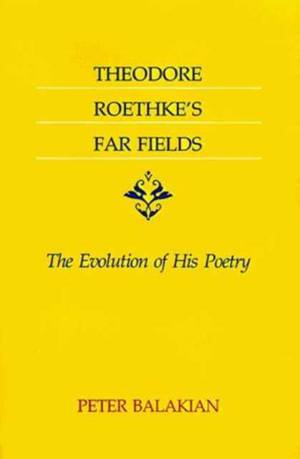
- Afhalen na 1 uur in een winkel met voorraad
- Gratis thuislevering in België vanaf € 30
- Ruim aanbod met 7 miljoen producten
- Afhalen na 1 uur in een winkel met voorraad
- Gratis thuislevering in België vanaf € 30
- Ruim aanbod met 7 miljoen producten
Omschrijving
In this critical study of Theodore Roethke's poetry, Peter Balakian treats the evolution of the poet's work from his first book, Open House (1941), to his last, The Far Field (1964). Balakian argues that Roethke was among the most innovative poets of his time and that The Lost Son and Other Poems (1948) brought America to a new frontier in the contemporary era. Balakian maintains that Roethke combined and furthered major traditions in English and American poetry -- the formal poetics and meditative sensibility of British metaphysical and Romantic poetry, the American visionary tradition, and the innovations of modernism.The early chapters of the book explore Roethke's intellectual, religious, nd psychological development and his development as a poet. Balakian discusses the influence of William Carlos Williams on Roethke's work and claims that the relationship between the two poets provided Roethke with a sense of the American grain. Later chapters treat the shift from self-absorption to union with otherness that marks Roethke's love poems, exploring the poet's development of mysticism and a poetic persona and examining the influences of Eliot and Whitman on his work. Balakian also discusses the metaphysical language necessary for Roethke's late poems and follows Roethke's spiritual progress as he prophetically faces his final work.In presenting the evolution of Roethke's career, Balakian offers fresh and original readings of the poetry. He avoids any monolithic approach to the body of Roethke's work, employing instead various approaches to Roethke's stages of poetic evolution. Balakian makes use of the psychology of C.G. Jung and Erich Neumann, the writings of the mystics, the aesthetics of William Carlos Williams, and the myth of the American frontier. With a literary historian's concern for Roethke's place in history and a critic's eye for the sources and structures of poetry, Balakian studies the resonances of language and the inner life of this poet's craft. Theodore Roethke's Far Fields places Roethke firmly in literary and intellectual history and asserts his place as a major poet.
Specificaties
Betrokkenen
- Auteur(s):
- Uitgeverij:
Inhoud
- Aantal bladzijden:
- 188
- Taal:
- Engels
- Reeks:
Eigenschappen
- Productcode (EAN):
- 9780807124543
- Verschijningsdatum:
- 1/03/1999
- Uitvoering:
- Paperback
- Formaat:
- Trade paperback (VS)
- Afmetingen:
- 152 mm x 229 mm
- Gewicht:
- 281 g

Alleen bij Standaard Boekhandel
Beoordelingen
We publiceren alleen reviews die voldoen aan de voorwaarden voor reviews. Bekijk onze voorwaarden voor reviews.











